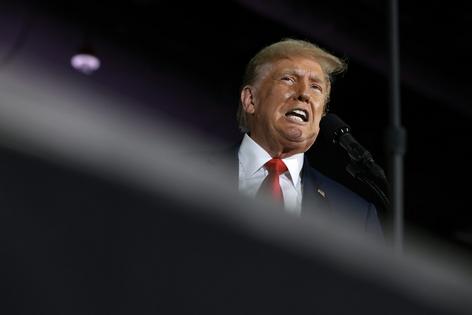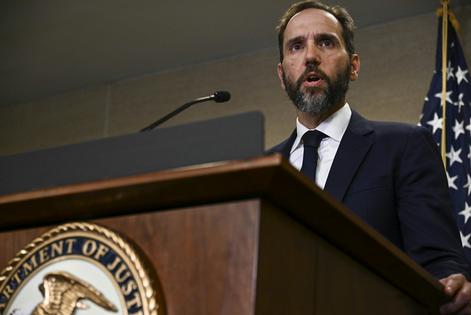‘Above the law’ in some cases: Supreme Court gives Trump − and future presidents − a special exception that will delay his prosecution
Published in News & Features
The United States Supreme Court has handed former president Donald Trump what may be the most favorable legal decision he could have reasonably hoped for in his fight against federal prosecution for his attempts to reverse the 2020 election outcome.
Justices split along ideological lines in a 6-3 decision issued on July 1, 2024, in which the conservative-dominated court declared that a former president has “some immunity for criminal prosecution for official acts during his tenure in office.”
The majority’s use of the word “some,” however, obscures the extent to which its opinion ensures that it will be much more difficult for special counsel Jack Smith to prosecute Trump for actions taken around the 2020 election, much less win that prosecution.
And depending on the extent to which future presidents take advantage of the breadth of legal protection the court is granting, the ruling may also produce fundamental shifts in the nation’s system of checks and balances among the three branches of government and the ability of the legal system to ensure the president complies with the law.
At issue in the case was whether the former president could be prosecuted for actions he took related to the 2020 election. Smith originally brought criminal charges against Trump in August 2023, alleging that Trump violated four criminal statutes, including conspiracy to defraud the United States, conspiracy to obstruct an official proceeding, obstruction of an official proceeding and conspiracy against voters’ rights.
Trump argued in an appeal that he could not be criminally prosecuted because he enjoyed absolute immunity for any “official acts” taken while in office.
Government prosecutors countered that the president was not “above the law” and that, given existing safeguards in the criminal justice system designed to mitigate politically motivated prosecutions, Trump should face legal accountability.
U.S. District Court Judge Tanya Chutkan earlier agreed with the government and dismissed Trump’s appeal in December 2023. The U.S. Court of Appeals for the District of Columbia Circuit agreed with her decision, writing in February 2024 that “President Trump has become citizen Trump” and therefore enjoyed no special protection from criminal prosecution.
After initially refusing to hear the case, the Supreme Court agreed to take it on Feb. 28, 2024, and heard oral arguments on April 25, 2024.
The ruling comes after what seemed to many an excessive, even purposeful delay.
Writing for the majority, Chief Justice John Roberts rejected Trump’s claim of absolute immunity from criminal prosecution for official acts taken while he was president, as well as the government’s claim that a former president is not “above the law” and can be criminally prosecuted for all actions done while in office.
Instead, the court ruled that some of the crimes that Trump is alleged to have committed are protected by immunity, but others may not be.
The justices sent the case back to the lower court to make a distinction between the alleged crimes that are now protected acts under the court’s opinion and the ones that remain open to prosecution.
The landmark opinion set general boundaries around how much of a president’s behavior is protected from prosecution. To do that, the court first determined that a president is absolutely immune for actions taken that are part of his “core” executive functions. These include the powers explicitly given to him in the Constitution, such as the pardon power and the power to remove executive branch officials, which are part of his “exclusive authority” into which neither Congress nor the judicial system may intrude.
For his noncore powers, which include all those not specifically listed in the text of the Constitution, such as the formulation of domestic policy, the court took a more nuanced approach.
Attempting to balance the “public interest in fair and effective law enforcement” with the need of the presidency to operate “vigorously” and free from fear of unwarranted prosecution, the majority held that the president has at least “presumptive immunity” for all acts that fall within the “outer perimeter of his official responsibility.”
The court did not clarify precisely what acts fall within this “outer perimeter.”
In an earlier case, Nixon v. Fitzgerald, for example, the court decided in 1981 that former President Richard Nixon’s directive while president to the secretary of the Air Force for how it should be staffed and organized was within that outer perimeter. In its opinion in the Trump case, the court emphasized that as long as the action is not “manifestly or palpably” beyond the perimeter, it should be considered official.
In those instances, the government must demonstrate that there would be “no dangers of intrusion on the authority and functions of the Executive Branch” before it can proceed with a prosecution.
The court also ruled in the immunity case that the president enjoys no immunity from criminal prosecution for nonofficial, private conduct.
The justices said it was up to the district court to determine which actions the indictment alleged Trump took were “official” and which were “unofficial” and thus not protected by immunity.
It offered a few guidelines for the lower court to follow.
First, immunity should extend to all actions that are within the “outer perimeter” of the president’s duties. In addition, a president’s motive could not be part of the consideration of whether an act was ‘offical" or “unofficial.” The court also emphasized that “testimony or private records of the President or his advisors” that were related to official conduct could not be used at trial to substantiate criminal charges for his unofficial conduct.
As a result of the opinion, the nation’s first federal criminal trial of a former president will not begin soon. Depending upon how long it takes Judge Chutkan to make the determinations about which aspects of the indictment are still subject to prosecution, it could very well be postponed until after the election.
And if Trump is reelected president, any trial would not occur until after he left office. He could also direct the Department of Justice to abandon the federal prosecution altogether.
Trump’s case was the first time the Supreme Court had been asked to determine whether and to what extent presidential immunity extended to criminal prosecutions of a former president.
In dissent, Justice Sonia Sotomayor, joined by fellow liberal Justices Elena Kagan and Ketanji Brown Jackson, rebuked the majority, writing that its decision created a “law free zone around the President.” Sotomayor asserted that the majority had ignored the text of the Constitution, misread history and precedent, and created an “atextual, ahistorical, and unjustifiable immunity that puts the President above the law.”
In a separate dissent, Jackson argued that the court had invented a new form of legal accountability, under which the president – and only the president – was exempt from the criminal law. In her view, a future president who ordered the assassination of a political rival would have at least a “fair shot” at avoiding any prosecution.
It remains at least somewhat unclear how the ruling will affect future presidents. If this case against Trump is indeed, as the government has argued, a “once-in-history prosecution,” then the court may never again be asked to determine how the criminal law applies to the nation’s chief executive.
If, however, the court’s decision frees future presidents to act in corrupt, even criminal ways, then the “rule for the ages” articulated in this opinion will have a major impact upon the separation of powers among the three branches of government, potentially giving far more power to the president than has been the case throughout American history. That will have huge implications for the functioning of the presidency and the stability, if not existence, of American democracy.
This article is republished from The Conversation, a nonprofit, independent news organization bringing you facts and trustworthy analysis to help you make sense of our complex world. It was written by: Claire B. Wofford, College of Charleston
Read more:
Supreme Court’s slow roll on deciding Trump’s immunity is the opposite of politics
Can Trump be prosecuted? Supreme Court will take up precedent-setting case to define the limits of presidential immunity
Trump was not king and can be prosecuted for crimes committed while president: Appeals court places limits on immunity
In March 2024, I donated $25 to the Biden Victory Fund.











Comments